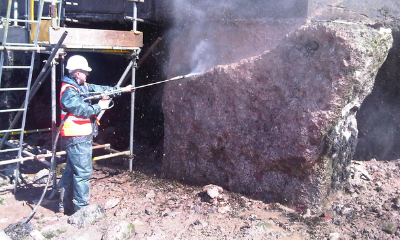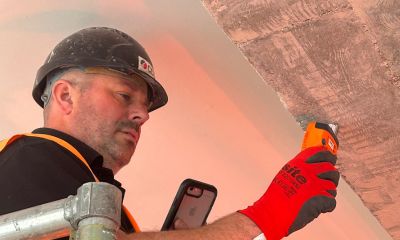An introduction to hydroblasting: an efficient, safe, and environmentally friendly way to clea, prepare and restore industrial surfaces and equipment.
Find out more with us at CCUK by calling 01482 425250
Deteriorated concrete, old coatings, large pipelines, and industrial surroundings can each benefit from a quick, safe, and planet-friendly blast cleaning procedure such as hydroblasting. With so many types of industrial cleaning readily available, it can be tough to know which one is best for your budget and the unique needs of your building, bridge, roads, etc. We hope you find this introduction to hydroblasting and blast cleaning helpful, and if you’ve any questions, feel free to call us on 01482 425250.
What does hydroblasting do?
Hydroblasting is a form of blast cleaning that uses high-pressure jetting with fresh water to clean, restore, or remove debris build-up from industrial surfaces, and equipment. Hydroblasting procedures are efficient, safe, environmentally friendly, and super effective, and they can be performed as part of almost any large-scale cleaning or restoration project. Not only is hydroblasting used for cleaning, but it is tough enough for debris removal and demolition, too.
Hydroblasting is a great option among other (more vigorous and abrasive) blast cleaning methods – such as grit blasting, wet blasting, vacuum blasting, and soda blasting. If you’d like to learn more about the other popular types of blast cleaning we offer, skip to our dedicated page here
In a nutshell, hydroblasting procedures are designed to clean, restore, and prepare industrial environments for future works – improving their appearance and function.
Common uses of hydroblasting
Hydroblasting includes the following services, but is not limited to:
- Concrete and debris removal;
- Corrosion removal;
- General industrial deep clean and removal of unwanted material build-up;
- Graffiti and large stain removal;
- Hydrodemolition (the removal of deteriorated or aging concrete in preparation for a repair);
- Pipeline cleaning;
- Refractory removal (a lining inside boilers or incubators);
- Removal of old or existing surface coatings;
- Line marking removal (such as roads, runways, bridges, and other concrete surfaces or structures);
- Tank cleaning;
- Tube cleaning.
For further information or to book your free feasibility survey & cost analysis, get in touch via our dedicated page. Please note that our blast cleaning services are available in the Yorkshire and the Humber region only.
Hydroblasting vs pressure washing
If you are looking into hydroblasting for an industrial property or workplace, a legitimate question you may ask is: “Isn’t hydroblasting just a fancy name for pressure washing? Is there a need to book a hydroblast specialist instead of doing an ordinary hose down?” And while they are similar in practise, the results can be very different and it’s all about the scale of the job at hand. While pressure washing involves using a hose, wand, or nozzle powered by a gas or electric pump and is ideal for domestic environments, hydroblasting involves a much higher water pressure (up to 40,000 psi) and is much more suited to an industrial environment.
If you’d like to further explore the differences between hydroblasting and pressure washing, feel free to give our friendly team a call on 01482 425250
The pros of choosing blast cleaning
The pros of blast cleaning methods such as hydroblasting include, but are not limited to:
- It’s cost-effective;
- Efficient – even on a tough material build-up;
- Effective;
- Environmentally friendly;
- Minimal dust and debris during;
- Minimal clean-up (as you’re already using water!);
- No need for harsh chemical usage;
- Rids of contaminants using only water;
- Safe during use and safe to be around;
- Used immediately before other services – a time saver.
Can you hire hydroblasting equipment online?
Although it’s true that hydroblasting equipment is readily available to hire or buy online, it is a procedure that requires prior training. At CCUK, our specialists are highly experienced in this effective form of industrial blast cleaning, and they know how to get it right! The last thing you want is to perform the procedure yourself in an effort to save money, only to have a specialist (or hydroblasting technician, as they are sometimes called) re-do the job again.
Is hydroblasting hard to do?
Much like most specialist construction services, hydroblasting requires training before it can be carried out. This isn’t to say you can’t hydroblast yourself – but it’s certainly quicker, safer, and more cost-effective to call upon a fully-trained and qualified contractor if you require large-scale industrial blast cleaning.
Hydroblasting near me
We are one of the UK’s leading construction companies offering blasting cleaning and preparation techniques – and we’re based right here in Yorkshire! For further information or to book your free feasibility survey & cost analysis, get in touch via our dedicated page
Suggested reading for you based on `hydroblasting`
Yorkshire and Humber: 7 Specialist Services Just For You
Concrete repairs brochure download





